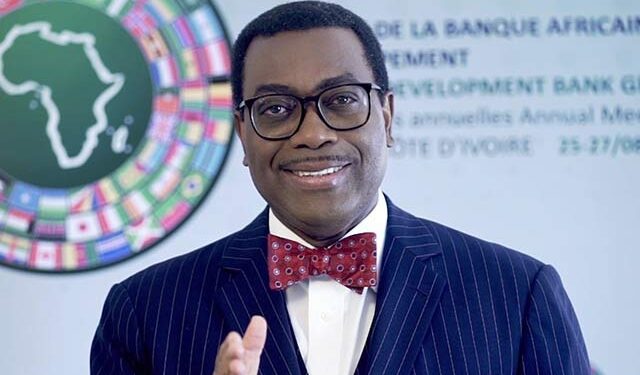Projected $57trn electric vehicle market depends on Africa, Dr Adesina says
“Five of the six pre-pandemic top-performing African countries are projected to be back in the league of the world’s 10 fastest-growing economies for 2023–2024. African economies provide some of the best investment opportunities in the world,”
Akinwumi Adesina, president of African Development Bank (AfDB) Group, has said the future of the electric vehicle market, estimated to increase from the current $7 trillion to $57 trillion by 2050, depends on Africa.
Adesina said this at the Africa Investment Forum 2023 on Wednesday at the Palace Congress, Marrakech, Morocco.
According to him, Africa accounts for the largest source of green metals for the development of electric vehicles, including platinum (70 percent), cobalt (52 percent), manganese (46 percent), bauxite (25 percent), and graphite (21 percent).
“Africa has the largest sources of renewable energy sources in the world, including hydro and solar. And right here in Morocco, you have the Noor Ouarzazate, the largest concentrated solar zone in the world,” he said.
According to EnergyPortal.eu, China stands as the largest EV market in the world and has made substantial investments in EV infrastructure and manufacturing.
“China has incentives such as subsidies, tax breaks, and license plate restrictions which has encouraged consumers to embrace electric mobility,” it said.
Adesina cited an assessment by Bloomberg NEF, which shows that the cost of manufacturing of lithium-ion precursor batteries in Africa is three times less than in the US, China, and Poland.
“Five of the six pre-pandemic top-performing African countries are projected to be back in the league of the world’s 10 fastest-growing economies for 2023–2024. African economies provide some of the best investment opportunities in the world,” he added.
The AfDB and partners are developing the $20 billion Desert-to-Power project across 11 countries that share the Sahel zone, which when completed will be the largest solar zone in the world, Adesina said.
Nigeria, Burkina Faso, Cameroon, Chad, The Gambia, Guinea Mauritania, Mali, Niger, Eritrea and Senegal are the countries located within the Sahel region.
“So, whether it is in oil and gas, minerals and metals, renewable energy, agriculture, or the labour force that will drive the global growth, Africa is where to be,” he said.
Adesina urged investors to put their monies in Africa.
“Investors should see Africa not from what they hear, but from what the facts say,” he added.
Justifying why investing in Africa makes a good business sense, he cited Moody’s analysis of default rates on infrastructure financing globally over the past 14 years which found Africa’s default rate, at 2.1 percent, is the lowest in the world, compared to Eastern Europe – well over 10 percent; and Asia, at well over 8 percent.
He further argued that Africa is not as risky as widely perceived as he also referenced S&P Global report in February 2023 titled ‘African private equity activity surges to 5-year high in 2022’.
“The number of deals increased from 211 in 2018 to 404 in 2022 — an increase of 91 percent. The total transaction value expanded from $4.65 billion in 2018 to $7.70 billion in 2022 — an increase of 66 percent, were all quoted in that report. Invest in Africa and reap high risk-adjusted returns,” Adesina said.
He also noted that the Africa Investment Forum is unique and remarkable due to its highly innovative, and 100 percent transactional nature.
Since the launch of the Forum in 2018, it has drawn more than 16,500 participants, and generated investment interest of nearly $143 billion, he said.
For instance, at the 2022 Africa Investment Forum Market Days, the Abidjan-Lagos highway corridor was able to secure $15.5 billion of investment interest. This corridor is expected to transform the entire West African region and speed up regional integration and trade.
Also last year, investment interests were secured for $3.6 billion for the East Africa railway corridor, linking Tanzania, Democratic Republic of Congo and Burundi.
According to the AfDB boss, the forum has so far closed on deals’ investment gaps worth $11 billion, ranging from liquified natural gas, renewable energy, agribusiness, industrial manufacturing, creative industry, housing, and transport.
Mohammed VI, king of Morocco, said that given the unprecedented situation and the scale of development financing needs in Africa, the role of the private sector has been gaining greater importance in achieving African countries’ development objectives.
“State budgets alone cannot cover all the investment needed, especially in high-potential, job-intensive sectors,” he said, adding that considering the great many investment opportunities it offers private operators, Africa needs, now more than ever, bold, innovative initiatives to encourage private entrepreneurship and unleash the full potential of our continent.
He said that is why initiatives such as the African Investment Forum, which is sponsored by the AfDB, are commendable because they help direct private investment towards the most promising economic sectors, thus reinforcing the integration of African economies into global value chains.


